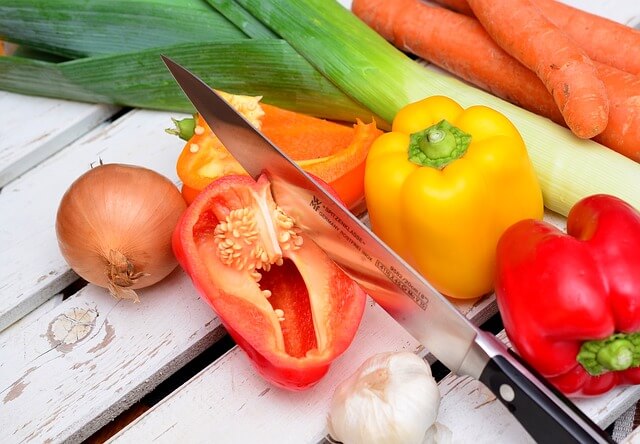26 Nov Foods to Avoid and Foods to Eat More of When You Have Eczema
Those of us with eczema are well versed in the importance of moisturising our skin, and using essential products like AproDerm® Emollient Cream to protect and prevent dry skin. But how many of us think about moisturising and treating from the inside out?
Doctors are increasingly recognising that diet and lifestyle factors contribute to all types of illness and health issues, subscribing to a philosophy as old as medicine itself. Indeed, the father of modern medicine Hippocrates famously said over 2,400 years ago:
“Let food be thy medicine, and medicine be thy food.”
We ignore this wisdom at our peril. As a long-term solution, treating the underlying problem from the inside can be a life-changing experience.
Contrary to popular belief, you can’t compensate for a diet that is generally poor with handfuls of supplements, so adjusting to a healthier diet is essential from the outset. No ready meals or processed foods, no takeaways or junk, and no foods with ingredients you don’t recognise; just pure, real, home-cooked food, full of health-giving fruits and vegetables. A lot of people recommend following a GAPS or Paleo diet, but for us the simple Mediterranean-style diet has paid dividends. Top this up with some beneficial additions, and you should begin to see an improvement in eczema conditions within 4-6 weeks, if not before.
Foods to Avoid
Refined Foods
Refined carbohydrates and sugars can easily upset the metabolism of essential fatty acids, as well as bringing their own detrimental effect on health.
Wheat & Grains
Some studies, and anecdotal evidence, suggest that consumption of gluten and yeast aggravates eczema, just as overgrowth of yeast in the gut and other bacteria-rich parts of the body can lead to thrush. It is best to avoid wheat, rye, barley and oats until you have made sure they are not responsible for your eczema.
Dairy
Often the body can see common food types as an invader, resulting in eczema. One of the most common of these is dairy, something the human body finds very difficult to digest. If you do not want to give up dairy without checking first, try an elimination diet*, and then gradually reintroduce things to see how your body responds.
Fats
Avoiding saturated fats is recommended, as they can encourage inflammation in the body. Reducing your consumption of red meat such as beef, pork and lamb should help.
Seafood, Eggs, Nuts, Peanuts & Sesame Seeds
These may affect some people, and it is best to experiment with them in and out of your diet to see how they affect your eczema.
Eat More
Go Veggie!
A vegan diet has been shown to ameliorate the symptoms of atopic dermatitis, so increase your consumption of beans, lentils and pulses, and complex carbohydrates like whole grains. These are also high in fibre which can also help tackle any underlying gut issues. However, avoid potatoes as they can aggravate eczema-prone skin.
You should also eat more fruit, vegetables and berries which contain high levels of antioxidants, as well as essential vitamins and minerals. Aim for a rainbow of 8-10 portions every day, most of them vegetables. This sounds daunting, but a large salad and vegetables with lunch and dinner; crudité snacks; and fruit for breakfast and dessert will see you at your target easily.
Healthy Fats
Coconut oil is a great healthy fat and can be used in place of oil or butter in cooking, or just taken as a spoonful or two a day. However, some people may be allergic to coconut oil, so make sure you are not one of the rare few before you get into the habit of using it a lot!
For cooking, hemp oil is a great fat, full of nutritious properties as well as essential fatty acids. Many eczema sufferers have low levels of EFAs in their body.
Supplementing with Omega 3-rich flaxseed/linseed or fish oils, and evening primrose** or borage seed oil is recommended. The consumption of seeds such as pumpkin and sunflower can also help, and they make a great snack or topping for a variety of dishes.
Fluids
Drink 1.5 to 2 litres of water daily, sipped slowly, and preferably not with meals. You can also drink diluted fruit juices and organic vegetable juices, preferably squeezed just before drinking, and herbal teas and tisanes.
Pre- & Probiotics
If the problem is gut-related, a course of probiotics will definitely help. On a day to day basis, adding more prebiotic-rich food like garlic, onions, asparagus, Jerusalem artichokes, and leaves like radicchio, endive and chicory. Good quality active bio-yogurt will boost probiotics.
Fermented Foods
If you would really like to boost the probiotics in your gut, start supplementing with fermented foods and drinks such as sauerkraut, miso soup, kombucha, kefir or kimchi, a Korean dish of salted vegetables, and salt brine-pickled vegetables.
Many people swear by consuming bone broth to improve skin condition, and this is something to look into if you are not vegetarian/vegan. Shop-bought ones tend to lack the necessary nutrients and gelatine, so you would need to research making your own. The book Nourishing Traditions has a recipe.
Where to Start?
Try the following nutrient-rich foods to start combating your eczema today:-
- VITAMIN C: Citrus fruits, kiwi fruit, sprouted seeds, blackcurrants, tomatoes, peppers.
- VITAMIN E: Wheat germ oil, nuts & seeds, fish, eggs, avocados, green vegetables.
- ZINC: Oysters, fish, liver, brewer’s yeast, eggs, whole grains, pumpkin seeds, mushrooms.
- RUTIN: Buckwheat
- QUERCETIN: Red & yellow onions, shallots, and apples.
- ESSENTIAL FATTY ACIDS: Oily fish, nuts and seeds.
- ACIDOPHILUS & BIFIDUM BACTERIUM: Natural bio-yoghurt.
* Always consult a medical practitioner before embarking on any major changes to your diet, or beginning an elimination diet.
** Do not use evening primrose oil if you suffer from epilepsy.






Sorry, the comment form is closed at this time.